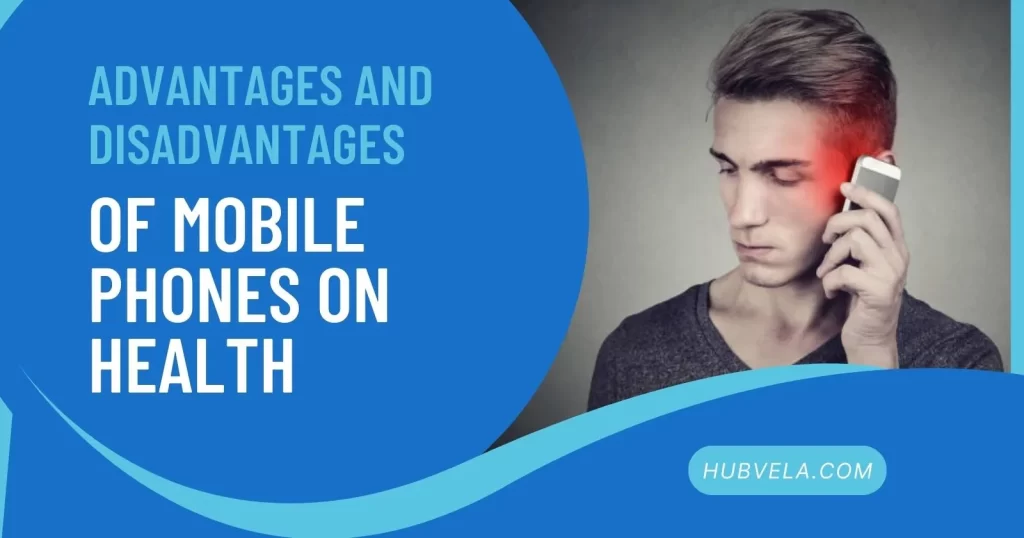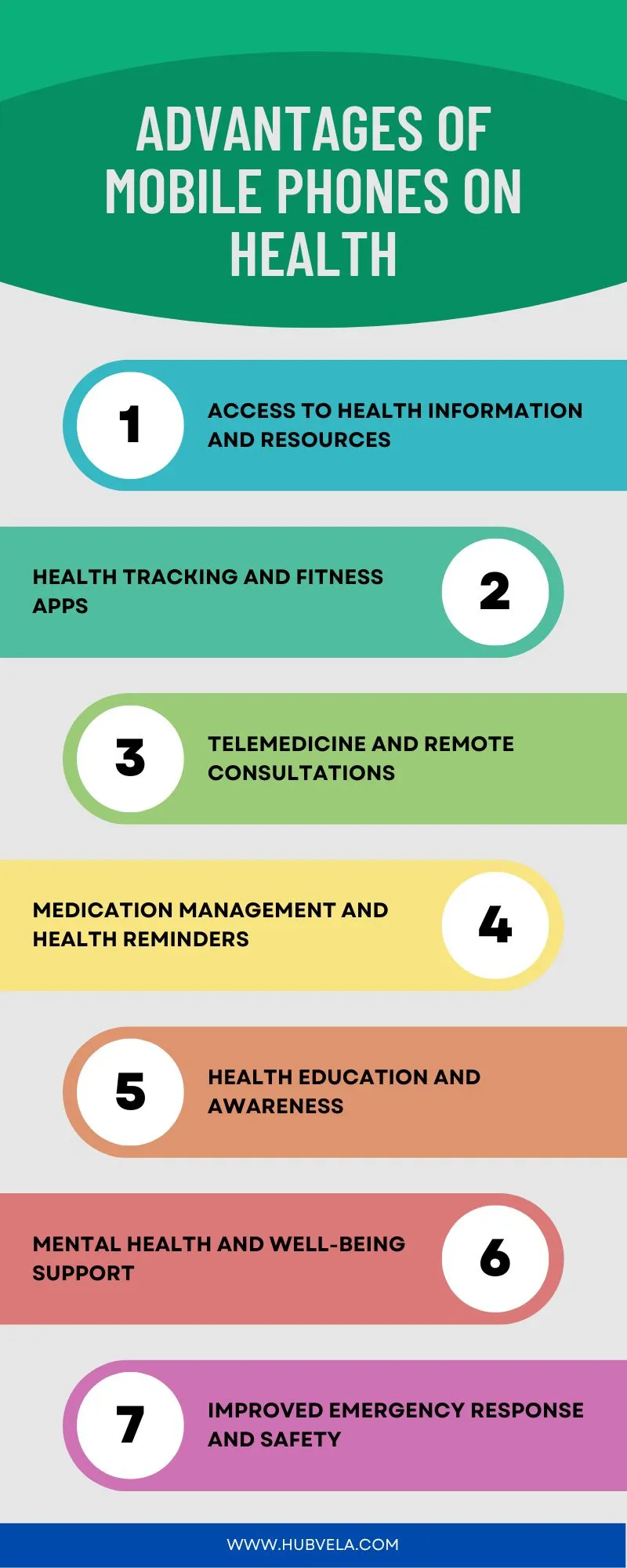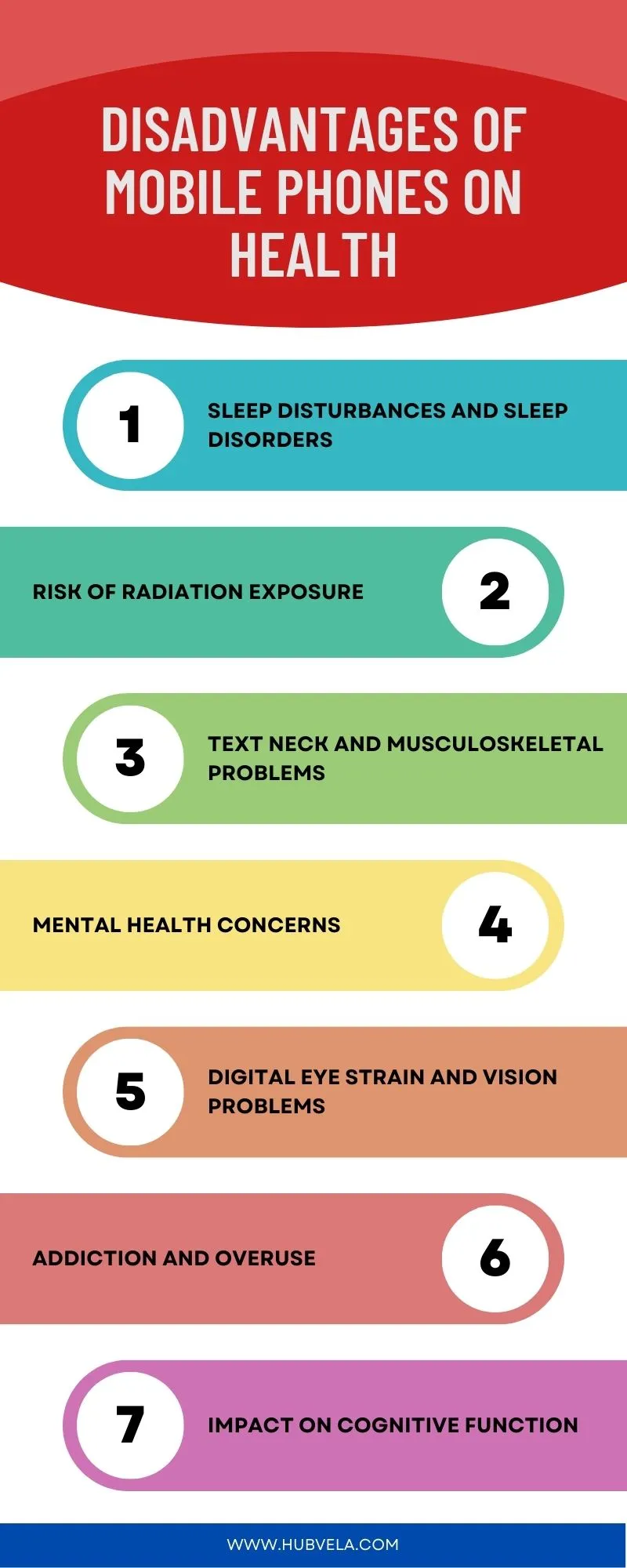Mobile phones have become an integral part of our daily lives. They have revolutionized the way we communicate, work, and entertain ourselves.
However, with the increasing use of mobile phones, concerns about their impact on our health have also risen. In this article, we will explore the advantages and disadvantages of mobile phones on health.
We will examine the potential benefits of mobile phones, such as their ability to connect people and provide entertainment, as well as the potential risks, such as addiction, distraction, and hearing issues.
We will also discuss the latest research on the health risks associated with mobile phone use and provide tips on how to reduce exposure to radiation.

--Advertisement--
Advantages of Mobile Phones on Health
Mobile phones have become an integral part of our daily lives, and their use has extended beyond communication and entertainment.
The use of mobile technology in healthcare has revolutionized the way healthcare professionals provide care to patients. Mobile technology has many benefits in healthcare, including:

1. Access to Health Information and Resources
Access to health information and resources has become more convenient with the use of mobile phones. Mobile devices have become a popular tool for healthcare professionals and students to access information about medical conditions and drugs.
Patients can also use mobile phones to access health information and resources, such as medical websites and apps. However, it is important to protect and secure health information when using mobile devices.
The U.S. Department of Health and Human Services has provided tips and information to help protect and secure health information stored on and sent by mobile devices, such as installing and enabling encryption.
Additionally, there are potential privacy risks when using mobile devices in healthcare, such as security breaches if electronic mobile devices are hacked, lost, or stolen.
It is important to follow HIPAA regulations when using mobile phones in healthcare to ensure patient privacy and security.
2. Health Tracking and Fitness Apps
Health tracking and fitness apps are becoming increasingly popular among mobile phone users. These apps can help individuals monitor their physical activity, track their diet, and monitor their health stats.
Some apps even have personal health coaches who can help users achieve their fitness goals and educate them about fitness activities.
During the COVID-19 pandemic, mobile apps and fitness trackers have offered unique benefits by allowing people to access health support remotely and engage in virtual activities.
Evidence from systematic reviews suggests that mobile apps and fitness trackers can improve physical activity. Moreover, smartphone apps and trackers that monitor physical activity may help people increase their activity levels.
Health tracking and fitness apps have the potential to improve physical activity and promote healthy behaviors.
3. Telemedicine and Remote Consultations
Telemedicine and remote consultations have become increasingly popular in recent years, especially with the widespread use of mobile phones.
Telemedicine refers to the use of digital information and communication technologies to access healthcare services remotely and manage healthcare.
Remote consultations are a form of telemedicine that allows patients to consult with healthcare providers without physically visiting a medical facility.
The use of mobile phones for telemedicine and remote consultations has several advantages. Patients can access healthcare services from the comfort of their own homes, which is particularly beneficial for those who have difficulty attending medical consultations because of where they live.
Mobile telehealth also allows for remote patient monitoring, which lets patients monitor symptoms or their condition from their home using mobile health devices.
Additionally, telemedicine and remote consultations can improve the quality of care and provide economic benefits.
The use of mobile phones for telemedicine and remote consultations can greatly benefit patients and healthcare providers alike.
4. Medication Management and Health Reminders
Medication management and health reminders are important aspects of maintaining good health, especially for individuals with chronic conditions.
Mobile phones have made it easier for people to manage their medications and stay on top of their health with the help of various apps.
These apps can remind users to take their medications on time, track their symptoms, and monitor their progress. Additionally, some apps can provide information about potential drug interactions and side effects.
With the help of mobile phones, individuals can take control of their health and improve their overall well-being.
5. Health Education and Awareness
Health education and awareness are crucial aspects of maintaining a healthy lifestyle. Mobile phones have become an essential tool in promoting health education and awareness.
With the widespread use of mobile phones, people can access health-related information easily. Mobile apps and websites provide information on healthy eating habits, exercise routines, and mental health.
Additionally, mobile phones can be used to remind people to take their medication, attend medical appointments, and track their health progress.
Mobile phones can also be used to connect with healthcare professionals, enabling people to receive medical advice and support remotely.
Mobile phones have revolutionized health education and awareness, making it easier for people to take control of their health and well-being.
6. Mental Health and Well-Being Support
Mobile phones have become an essential part of our daily lives, and they have also proven to be beneficial for our mental health and well-being.
With the rise of mental health awareness, many mobile applications have been developed to provide support and guidance to those who need it.
These apps offer a range of services, including meditation, mindfulness, and stress management techniques.
Additionally, mobile phones provide easy access to mental health professionals and support groups, which can be helpful for those who are struggling with mental health issues.
With the help of mobile phones, people can now access mental health and well-being support from the comfort of their own homes, which can be especially beneficial for those who live in remote areas or have limited access to mental health services.
Mobile phones have proven to be a valuable tool in promoting mental health and well-being support.
7. Improved Emergency Response and Safety
Mobile phones have revolutionized the way emergency response and safety measures are taken. With the advent of mobile phones, emergency services can be reached quickly and easily.
In case of an emergency, mobile phones can be used to call for help, and the location can be easily tracked using GPS technology.
This has significantly reduced the response time of emergency services, which can be the difference between life and death in critical situations.
Mobile phones also come equipped with various safety features such as emergency contacts, medical ID, and safety apps that can be used to alert authorities in case of danger.
These features have made mobile phones an essential tool for ensuring the safety of individuals, especially those who are vulnerable such as children, elderly, and people with disabilities.
The improved emergency response and safety measures made possible by mobile phones have had a significant positive impact on public health.
Disadvantages of Mobile Phones on Health
Mobile phones have become an integral part of our daily lives, and it is estimated that there are around five billion mobile phone users worldwide. However, there are concerns about the potential health risks associated with mobile phone use.
The low levels of radiofrequency (RF) radiation emitted by mobile phones have been linked to health problems such as headaches, brain tumors, changes in brain activity, reaction times, and sleep patterns.
While research is ongoing, no negative health implications have yet been found. We will explore the disadvantages of mobile phones on health and provide tips on how to reduce exposure to RF radiation.

1. Sleep Disturbances and Sleep Disorders
Sleep disturbances and sleep disorders are some of the disadvantages of mobile phones on health. The blue light emitted by screens of mobile phones can contribute to poor sleep quality by delaying the circadian rhythm, the body’s normal sleep-and-wake clock.
Bedtime use of media devices, including mobile phones, has been positively associated with poor sleep quality and excessive daytime sleepiness.
A recent review reported that one in every four children and young people are suffering from problematic cell phone use (PSU), which is linked to depression, anxiety, and poor sleep quality.
Addiction to smartphones can also result in poor sleep quality. Furthermore, accessibility implies the possibility of being disturbed at all hours, even at nighttime, which can have direct effects on recovery and health.
Therefore, it is recommended to avoid using mobile phones before bedtime and to put them on “do not disturb” mode or silent to avoid interruptions during deep sleep.
2. Risk of Radiation Exposure
Mobile phones emit radiofrequency (RF) radiation, which raises concerns about the risk of radiation exposure and its potential health effects.
Although there is no categorical proof of any adverse biological effects other than tissue heating, some studies have reported adverse health effects of using mobile phones, including changes in brain activity, reaction times, and sleep patterns.
The available scientific data on exposure to radiofrequency energy show no association between exposure to radiofrequency energy from cell phone use and health problems.
However, the evidence to date suggests that cell phone use does not cause brain or other kinds of cancer in humans.
To reduce the risk of radiation exposure, the FDA has suggested some steps that concerned cell phone users can take, such as reserving the use of cell phones for shorter conversations or for times when a landline phone is not available and using a device with hands-free technology, such as wired headsets, which place more distance between the phone and the head of the user.
3. Text Neck and Musculoskeletal Problems
Text neck is a term used to describe the pain and discomfort that can result from prolonged use of mobile devices, particularly smartphones.
The condition is caused by the forward head posture that is adopted when using these devices, which can strain the neck muscles, alter spinal alignment, and compress nerves.
Text neck can lead to various musculoskeletal problems, including pain in the neck and shoulder.
Studies have shown that texting can be associated with musculoskeletal disorders of the neck and upper extremities, particularly in young adults.
Excessive use of smartphones may cause various physical and psychological health problems, including neck disability due to poor posture associated with smartphone use.
It is important to be aware of the potential health impact of mobile device use and to take steps to prevent text neck, such as taking frequent breaks and practicing good posture.
4. Mental Health Concerns
Excessive use of mobile phones has been found to have a negative impact on mental health. Smartphones have an addictive quality, which can lead to loss of interest in activities, anxiety, and irritability when one is away from their phone.
A study among teenagers revealed that smartphones contributed to increased depression rates. Smartphone addiction can lead to heightened levels of stress, anxiety, and depression.
People who suffer from smartphone addiction often find themselves unable to put the device down and may experience anxiety and irritability if they cannot use their phone for an extended period or if their access is restricted.
The overuse of smartphones has been associated with various mental health issues, including depression, anxiety, and obsessive-compulsive disorder.
In a study of college students, more than 50% of students who used their phones for the greater part of the day experienced headaches, easy irritability/anger, anxiety, insomnia, lack of concentration, and poor academic performance.
Therefore, excessive use of mobile phones can lead to mental health concerns such as anxiety, depression, and other related disorders.
5. Digital Eye Strain and Vision Problems
Digital Eye Strain and Vision Problems are some of the health issues associated with the excessive use of mobile phones.
Digital Eye Strain, also known as Computer Vision Syndrome, is a condition that results from staring at digital screens for extended periods.
Symptoms of Digital Eye Strain include dry eyes, blurred vision, headaches, and neck and shoulder pain. Vision Problems, on the other hand, are caused by the blue light emitted by mobile phone screens.
Blue light can penetrate the retina and damage the cells, leading to vision problems such as macular degeneration and cataracts.
To prevent these health issues, it is recommended to take breaks from mobile phone screens, adjust the screen brightness, and use blue light filters.
6. Addiction and Overuse
The widespread use of mobile phones has led to concerns about addiction and overuse, which can have negative effects on health.
Addiction to mobile phones is a growing problem, with many people feel anxious or stressed when they are unable to access their devices.
Overuse of mobile phones can also lead to physical health problems, such as eye strain, headaches, and neck pain.
In addition, excessive use of mobile phones can interfere with sleep patterns, which can have a negative impact on overall health and well-being.
It is important for individuals to be aware of the potential risks associated with mobile phone use and to take steps to limit their usage in order to maintain good health.
7. Impact on Cognitive Function
Research has shown that excessive use of smartphones can potentially lead to impairments of cognitive functions.
Although there is not yet clear evidence that smartphones have a long-term negative effect on the brain, health experts are concerned that excessive use can be harmful, especially to children whose brains are not yet fully developed.
A study in the Journal of the Association for Consumer Research found that cognitive capacity was significantly reduced whenever a smartphone is within reach, even when the phone is off.
Smartphones may also impair cognitive function, especially working memory, which is of great importance for daily activities.
While the potential health consequences of excessive mobile phone use are still unknown, it is important to be aware of how you use your phone and prioritize other activities and in-person interactions whenever possible.
Conclusion on Advantages and Disadvantages of Mobile Phones on Health
In conclusion, mobile phones have become an integral part of our daily lives. They have brought many advantages, such as easy communication, access to information, and entertainment.
However, they also have some disadvantages, including potential health risks, distraction, and addiction. While research continues into whether or not mobile phone use causes health problems apart from cancer, no negative health implications have yet been found.
Scientists have reported adverse health effects of using mobile phones including changes in brain activity, reaction times, and sleep patterns.
Excess use of cell phones has been associated with negative effects on physical and mental well-being. It is important to understand the risks and possible effects of mobile phone use and make up your own mind about how you use your mobile phone.


